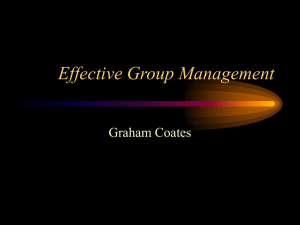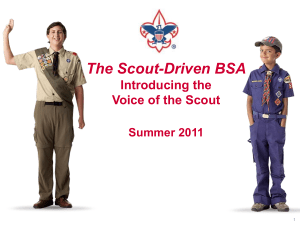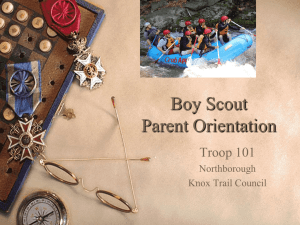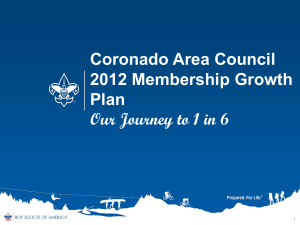Board of Review (BOR) - Saddleback District
advertisement
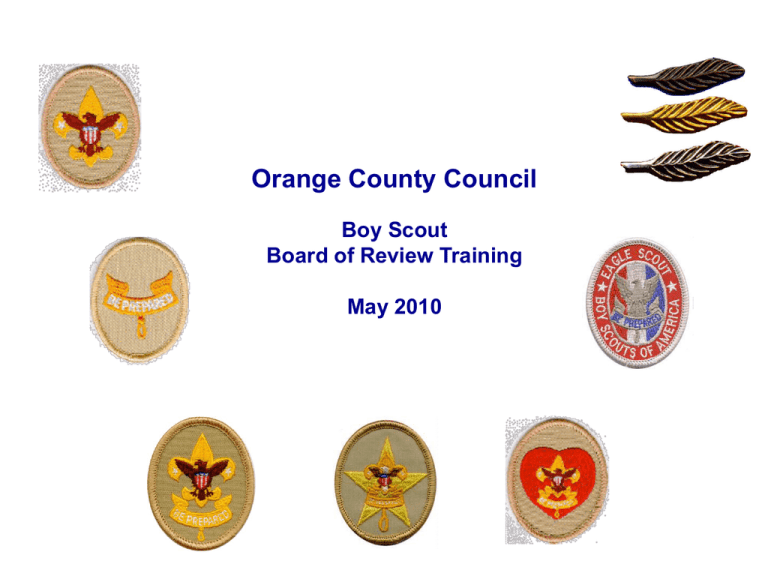
Orange County Council Boy Scout Board of Review Training May 2010 Purpose of the Board of Review Tracks the progress of a Scout Determines Scout’s understanding of the ideals of Scouting and how he applies them in daily life in the Unit Board satisfies itself that the Scout has done what he was supposed to do for that rank Review with the Scout the requirements for the next rank A board should be held to review a Scout’s accomplishments or lack of accomplishments Also a way of reviewing the unit's progress\health Board of Review Characteristics An informal, friendly growth experience. Not an interrogation, not a retesting of a Scout’s competence In a good BoR, you may listen more than you speak Determines the Scout’s attitude and acceptance of Scouting’s ideals, both in the unit and outside of it An informal conversation between the Scout and a group of adults who are interested in his welfare and are supportive of his efforts Checks on “health of the unit” Reviews with Scout the requirements for the next rank and motivates him to continue on the path Lasts approx. 15 minutes (Eagle BoR is approx. 30 -45 minutes) Who Conducts the Board of Review? Tenderfoot through Life, Eagle Palms Who At least 3, not more than 6 members Who Does Not Scout’s Unit Leader or Assistant Unit Leaders (SM, Asst. SM, Coach, Asst. Coach, Advisor, Asst. Advisor) Must be over 21 years old Unit Committee Members Relatives of the Scout One member serves as chair Parent or Guardian of the Scout Other Scouts Tenderfoot Through First Class BoR Time to know the Scout better, reviewing his progress in achievements, and discussing how he felt about the various steps he has taken on the Scouting trail Should not be a time of retesting, but rather a time to reflect on the skills learned and how the Scout has absorbed the ideals of Scouting Questions at these ranks could deal with campouts, activities, etc. May deal with how he is getting along with other Scouts How does he exhibit the Scouting ideals outside the unit Time to ask the Scout how he feels about the unit’s program, whether he feels he is learning anything and is he having fun Time to assess his Scout spirit Star & Life Board of Review The Star and Life boards of review will be a bit longer than previous ones The Scout will have acquired many more skills and will demonstrate more maturity Leadership will be one of the significant topics to be discussed Each of these ranks involves service projects, and you should ask the Scout how he felt about the projects As before, you will also be evaluating his Scout spirit By this time, you will have reached certain conclusions about the Scout, but remember that at these ages, the Scout will be able to change fundamentally much quicker than you would imagine and the BoR may be an occasion for you to reevaluate the Scout Eagle Palm Board of Review Encourage the Scout to remain connected to the unit in a visible way. Do not be discouraged if a high school student is less able to devote his spare time to Scouting You should be able to tell if a Scout is living up to the ideals of Scouting outside the unit as well as inside it Eagle Palm boards of review are opportunities to have a giveand-take discussion with the very best in Scouting Always conclude these boards of review with words of encouragement - Enjoy it! When & Where to Hold a Unit Level BoR When Consider monthly (for larger units, maybe weekly) Possibly at the same time as a unit meeting BSA training guide suggest “Ideally, a Scout should sit for a Board of Review every six months, whether he is advancing or not” Where Where board members and Scout are only ones aware of what is going on Where there is no possibility of embarrassing Scout in front of others Possible locations such as: - Room in chartered organization's facility - Conference room at office of a board member - A campout or summer camp Mechanics of Advancement BoR Scout neat in appearance, uniform “correct as possible” Introductions of Scout to BoR members BoR Chair can ask the Scout to come to attention, and recite one or more of the following: The Scout Law, The Scout Oath, The Scout Motto, The Scout Slogan BoR members are invited to ask Scout open ended questions Deliberation - Scout leaves the room - Have a discussion that leads to a unanimous decision - Most stressful part of the process for the Scout, should not take long Scout notified of Board’s decision - End BoR by praising the Scout for the positive aspects of: his character, his skill level, and/or his accomplishments - Scout holds his new rank as of the date of the BoR Present the badge of rank as soon as practical after BoR Advancement Report The Advancement Report for a rank advancement must be signed by all BoR members (at least 3 adults) If a Scout has BoRs for Tenderfoot, 2nd Class, and 1st Class on the same day, they may be all listed on the same report. Multiple Scouts may be listed on a report, as long as the BOR members are the same. Note: For LDS units that have a Troop, Team & Crew, submit separate Advancement Reports for each unit. BoRs held on different dates must be submitted on separate Advancement Reports At least 2 add’l BoR members sign BoR Chair signature Enter each Scout’s name, BoR date, & Rank earned Enter date of BoR Challenges for Boards of Review Some Scouts may freeze up or forget simple items at the BoR. The board should encourage and support these boys in a friendly, kind, and courteous manner and help them become more comfortable. A Scout who is poorly prepared for the board, one who clearly has not achieved what his book says that he has, is a product, as much of his own merits as of the merits of those who have brought him to the board. This does not grant carte blanche to the ill-prepared Scout, but it does give the board a way to understand what must be done and to help the Scout. Understanding any substituted rank requirements (preapproved for Scouts with disabilities). The board members should be briefed prior to meeting with the Scout. Challenges for Boards of Review (cont.) Defining and measuring Scout Spirit It is how a Scout lives and conducts his daily life. He shows Scout spirit by being a role model to his peers, living by the Scout Oath and Law. It is not based on how many Scouting events or outings a Scout attends, but rather by how he helps bring out the best in others as a reflection of his own character and attitude in his daily life. A Scout is to “be active in your unit and patrol”, consider: • Is he currently registered in the unit (has paid registration fees) • Has he been dismissed from the unit for disciplinary reasons • In communication with the unit leader on a regular basis, such as: • Phone calls • E-mail invite to activities • Scout Master Conference Units may not create their own definition of active; - this is a National standard Duty to God Discussion of a Scout’s religion may be appropriate at a BoR, but it should be done with respect and appreciation for the variety of faiths and beliefs in the United States Scouting maintains that no member can grow into the best kind of citizen without recognizing an obligation to God The BSA recognizes the religious element in the training of the Scout, but it is absolutely nonsectarian in its attitude toward that religious training A Scout may fulfill this duty without being a member of a particular denomination or religion “Non-Advancement” BoR Reasons to have a Board of Review may include - Scout's lack of advancement - Perceived trouble in the unit -A certain event at the last campout or unit meeting Guidance and care should be shown to encourage advancement Ask the kind of questions that may reveal why Scout is not advancing If resolving a problem, should be non-confrontational BoR & Health of the Unit The Board of Review can contribute to maintaining a healthy unit. It is the ideal place to encourage leadership, to check on problems the Scoutmaster sees arising, to head off future problems, and to make sure the Scout is on track to accomplish the goals and methods of Scouting. The Board of Review should: Be a way of encouraging the individual Scout Assess the needs and desires of a Scout Encourage and support the Scout Help the Scout to see himself in the greater context of Scouting Encourage personal growth, both in skills and in living up to the ideals of Scouting The Board of Review should NOT: Be a heavy-handed interrogation Be an attempt at disciplining a wayward Scout A retesting of a Scout’s competence A marathon session Denying Advancement BoR training guide states “having a Scout deferred for advancement by the Board of Review is unusual. If there is a problem (has not met the requirements) with a Scout, normally he will not be presented to the Board of Review” Board should give the Scout the opportunity of learning what he needs to do to advance Scout should be given a definite time for a subsequent Board of Review Follow-up letter from the committee must be sent confirming agreement and necessary actions Scout should be given appeal procedure information if he disagrees with BoR decision Appealing a Decision Appeals of BoR decisions will be made, principally because the Scout believes his opportunity to achieve Eagle are diminishing. When can appeals occur? Unit leader or unit committee does not recommend a Scout for a BoR or fails to sign an Eagle rank application If a Board of Review does not find favorably for the candidate Appeal can be made by the Scout, his leader, or the Scout’s parent\guardian. The “Appeal Chain” is to the next highest level: Unit District Council National Boy Scout Committee Committee to whom the appeal is addressed will promptly review the facts: All parties must be interviewed by the committee, hopefully without confrontation A written report with all details will be prepared by the reviewing committee and forwarded to the National Boy Scout Committee. (Appeals to the National Boy Scout Committee are made only through the local council. There is no direct appeal by a Scout or Unit) Varsity and BoRs Boy Scout Rank Advancement for Varsity Scouts All Varsity Scouts may continue to work towards all Scout ranks up to his 18th birthday He must meet the requirements as prescribed in the official Boy Scout Handbook and the current Boy Scout tequirements. The Varsity Scout fulfills leadership requirements by serving as Captain, Co-Captain, Program Manager, Squad Leader, Team Secretary, OA Team Rep, Librarian, Historian, Quartermaster, Chaplain Aide, Instructor or Den Chief for his Team The Scoutmaster conference will be conducted by the Varsity Coach As the Varsity Scout meets requirements for the Star and Life ranks, a Board of Review will be conducted by the Team Committee The Eagle Scout BoR follows the procedures established by the local Council Venturing and BoRs Boy Scout Rank Advancement for Venturers Any male Venturer who has achieved the First Class rank as a Boy Scout in a Troop or Varsity Scout in a Team may continue advancement toward the Star, Life, and Eagle Scout ranks up to his 18th birthday He must meet the requirements as prescribed in the official Boy Scout Handbook and the current Boy Scout requirements. The Venturer fulfills leadership requirements by serving as President, Vice President, Secretary, Treasurer, Den Chief, Quartermaster, or Historian of his Crew. The Scoutmaster conference will be conducted by the Advisor. As the Venturer meets requirements for the Star and Life ranks, a Board of Review will be conducted by the Crew Committee The Eagle Scout BoR follows the procedures established by the local Council Who Conducts the Board of Review? Eagle Scout Rank Who O.C. Council decided that Eagle BoR is at District level Minimum 3, Maximum 6 members, age 21 or older Do not have to be registered in Scouting but must understand importance and purpose of Eagle BoR Who Does Not Unit Leader or Assistant Unit Leaders (SM introduces Scout to BoR) Relatives of Scout Parent or Guardian of the Scout Resources for Board of Review: Every aspect of advancement procedures is discussed in the Advancement and Recognition Policies and Procedures (No. 33088), which is updated and reprinted annually Committee members should have a copy of the Troop Committee Guidebook (No. 34505) Supplemental Training module “BoR Training” publication 18625 http://www.scouting.org/scoutsource/BoyScouts/TrainingModules/BoardofReviewTraining.aspx Boy Scout Requirements online http://www.scouting.org/scoutsource/BoyScouts/AdvancementandAwards.aspx BoR District Guide with sample questions http://www.macscouter.com/Scoutmaster/BoR_Guide.asp (while useful this is not an official BSA site) Questions? contact: Pat Robinson, Saddleback District Adv. Chair E-mail: jeptr@aol.com
